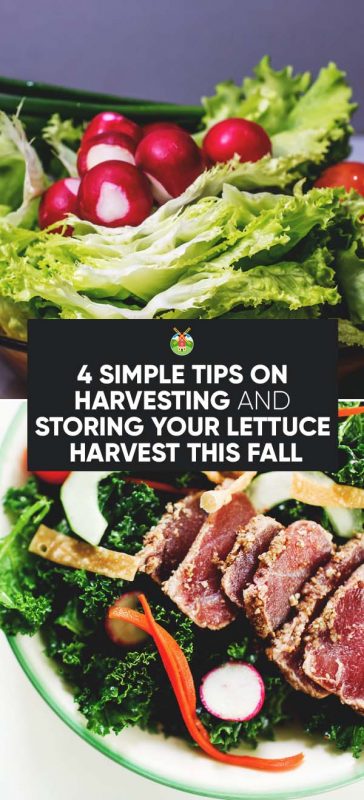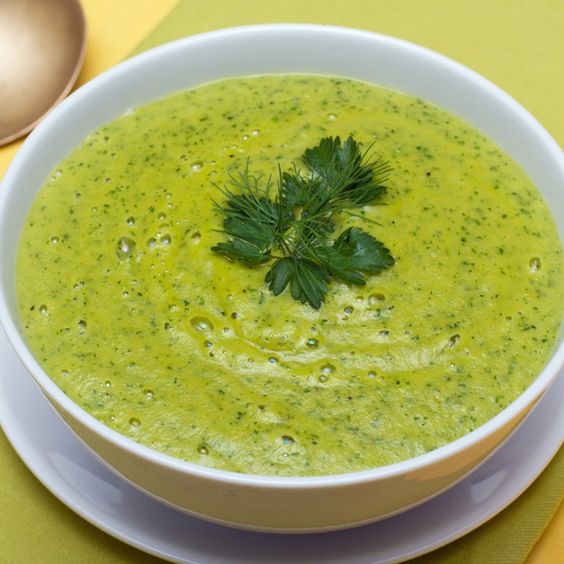How To Store Mixed Lettuce After Harvest From Garden
Don't you just love lettuce? The crisp and the crunch of it while it is covered in your favorite dressing along with other good vegetables. It just makes you feel good, doesn't it?
So it shouldn't come as a surprise that many people like to grow it, especially in the fall when it is nice and cool.
See, lettuce loves cool temperatures. That is why it can be produced during winter in a greenhouse, in early spring when your body is craving something fresh, or in the fall as the weather starts to cool off after a long hot summer.
However, if you are going to grow it, then you need to know how to harvest lettuce and also how to make it last as long as possible. Well, here is the information you are going to need:

Everything You Need to Know About Your Lettuce Harvest
1. Harvesting Lettuce
Harvesting lettuce will vary a little depending upon what kind of lettuce you have decided to grow. If you go with leaf lettuce, then you'll have to trim it off when it is about 4-8-inches tall. You can snap it off with your fingers, but I personally prefer to use scissors to cut it.
However, I would recommend only planting a small amount of leaf lettuce (unless you have a really large group of people to feed) because if you trim it back to the surface, the plants will produce new foliage in only a matter of weeks.
You will constantly have fresh lettuce coming in.
Still, if you plant lettuce that forms heads like Romaine lettuce or Iceberg lettuce, then you'll want to wait until the heads have reached the desired size.
Then you can use a sharp knife to cut the heads of lettuce off at the soil. When you have harvested your lettuce, you'll have to put the heads in a larger basket so they don't bruise in between the garden and getting them to your kitchen.
Also, be sure to cut the core and any dark or damaged spots out of the lettuce prior to bringing it in for storage.
Once you have harvested your lettuce, you need to know how to clean and store it.
2. How to Clean Your Lettuce
Now that you have harvested your fresh, green, and crisp lettuce it is important to know how to clean it. The downside to growing your own lettuce is that if you don't clean it thoroughly, you could end up ingesting dirt and bugs.
Though those things aren't really bad for you, in our minds, they are rather gross so we try to avoid it.
You'll have to ask yourself a few questions before cleaning your freshly harvested lettuce:
- Am I going to consume the lettuce right away?
- What type of lettuce am I looking at?
If you are going to consume your lettuce right away, then you'll definitely have to wash it. When washing it, you'll place each head in lukewarm water for about 30 seconds. This helps to loosen any really tough, stuck-on dirt and determined little bugs.
Then you'll remove the lettuce and wash it under cold water for about 30 seconds. This round of washing will remove any loose dirt.
Finally, you'll run the lettuce under cold water as many times as you feel necessary for 30 seconds at a time until you feel comfortable that you have removed all dirt and bugs.
Then you'll place the lettuce in a colander or lettuce spinner to dry. If you use a colander, you'll have to allow it to drip dry for about 10 minutes. If you use a lettuce spinner follow the instructions. It usually only takes about 2 minutes for dry time.
Now, if you aren't planning on using the lettuce right away (and you are washing head lettuce), then you'll have to wait to wash it until you are going to use it. Just follow the same steps when this time comes. When using head lettuce, it actually lasts longer if it is not introduced to excess moisture.
However, we still must answer question number 2; what kind of lettuce am I looking at? If you have grown leaf lettuce, it is a great producer, but only lasts for about a week at a time.
So you'll definitely need to wash and use as quickly as possible.
However, if you grew head lettuce, like Romaine or Iceberg, then don't wash it, and it should last for at least a couple of weeks.
3. How to Store Lettuce
How you store lettuce also determines how long the lettuce itself will last. Moisture is a huge enemy for lettuce so it is important to store it in a way that excess moisture can't ruin it, and it is also important to keep your lettuce cool.
Let's begin with leaf lettuce. If you have harvested leaf lettuce, you'll have to follow the instructions above to clean it. Then you will allow the leaf lettuce to dry.
Next, you'll wrap the lettuce in a paper towel to absorb any excess moisture. You then place the leaf lettuce in a storage bag and place it in your fridge. Keep an eye on the paper towel every day. If you begin to see that it is full of moisture, then it is time to unwrap the lettuce and wrap the leaves in a fresh paper towel which can better pull moisture.
Now, if you are trying to store head lettuce, you'll have to delay washing until you plan on using it.
However, if you have a large head, then you'll have to wash, dry, wrap in a paper towel, and store in a plastic bag in your fridge until you use it up.
Again, it is important to watch the paper towel to make sure that it doesn't become too damp. If you see that it is becoming saturated with water, then you'll need to pull that paper towel out and wrap the lettuce in a fresh paper towel. This is important because the more moisture you keep away from the lettuce, then the crisper it will remain.
4. Can You Preserve Lettuce?
Yes, you can actually preserve lettuce for long-term use. To the best of my knowledge, you can't can it.
However, you can use other preservation methods. The first method you can use is freezing. Yes, you can actually freeze lettuce! How nice is that?
Now, I need to be upfront with you. You don't want to freeze it thinking you'll have fresh salads in the middle of winter. Instead, you'll freeze it to use in a casserole, soup, or a stew even. You would definitely have to cook it for it to be desirable to your taste buds.
Even so, you just clean the lettuce and pop it in a freezer bag until you are ready to cook with it. It is very simple and a great way to preserve your lettuce harvest if you have too much come in at once.
Also, I should mention, that thicker lettuce types (like Romaine) are best for this method. When you freeze lettuce, it will crystalize. If you freeze thin lettuce, then it turns into a goopy mess.
However, if you freeze a thicker type of lettuce, then it can withstand the moisture from the crystallization process that takes place during freezing.
Our second method is fermenting lettuce. I know, you may be thinking I've lost my mind, but I really haven't.
Now, I'm still having to jump on board with all of the fermented foods crazes. I know they are good for gut bacteria which is great for our health, but I'm still new to this.
However, this seems like a great way to preserve lettuce and enjoy it in a unique and healthy manner. Not to mention, it doesn't take many ingredients to actually ferment lettuce, which is always a good thing.
Finally, you can dehydrate lettuce. This seems like a really great option in my personal opinion because it is easy, quick, and you can use it for lots of different things.
For instance, if you are really big into healthy green smoothies, then you might like dehydrating lettuce for that burst of green in your smoothie. You just dehydrate and then turn your lettuce into a fine powder that will easily add a health boost to your favorite smoothie.
Or you could use dehydrated lettuce leaves for making delicious chips. This could be a healthy snack that you might really enjoy.
Recipes to Utilize Your Lettuce Harvest
When you grow lettuce, let's be honest, you can only eat so many salads before you are just burned out. That is why I wanted to bring you a couple of recipes from around the web that will show you that lettuce can be used for much more than a basic salad.
Here is what I came up with:
1. Stir-Fried Lettuce

This lettuce looks like a delicious side to add to any healthy dinner. It includes many of the traditional flavorings of other stir-fries you might have had.
However, this one is all based around Romaine lettuce, and it only takes about 5 minutes to make too!
Try this lettuce recipe
2. Lettuce Soup

This might blow your mind on a cold winter day, lettuce might be what you use to warm up.
With this recipe, that could definitely be the case. You'll have to check it out!
Try this lettuce recipe
3. Grilled Romaine Lettuce

This is another hearty dish that is based around lettuce. You take a whole head of Romaine lettuce and grill it with other delicious vegetables and flavors.
Then you have quite a healthy, delicious, and easy meal in no time flat.
Try this lettuce recipe
4. Lettuce Wraps

The first time I ever heard about a lettuce wrap was from my sister about 10 years ago. PF Changs had just moved into our area, and she was hooked.
Now, fast forward a decade later and lettuce wraps are very common, but I still think most would agree that PF Changs' wraps are still amazing. Which is why I thought many people would appreciate this recipe.
Try this lettuce recipe
Well, you now know how to harvest, clean, store, and preserve your lettuce harvest. You even have a few recipes to utilize your harvest that is a bit outside of the norm.
Was this article helpful?
Yes No
How To Store Mixed Lettuce After Harvest From Garden
Source: https://morningchores.com/harvesting-lettuce/
Posted by: garciajusture70.blogspot.com

0 Response to "How To Store Mixed Lettuce After Harvest From Garden"
Post a Comment